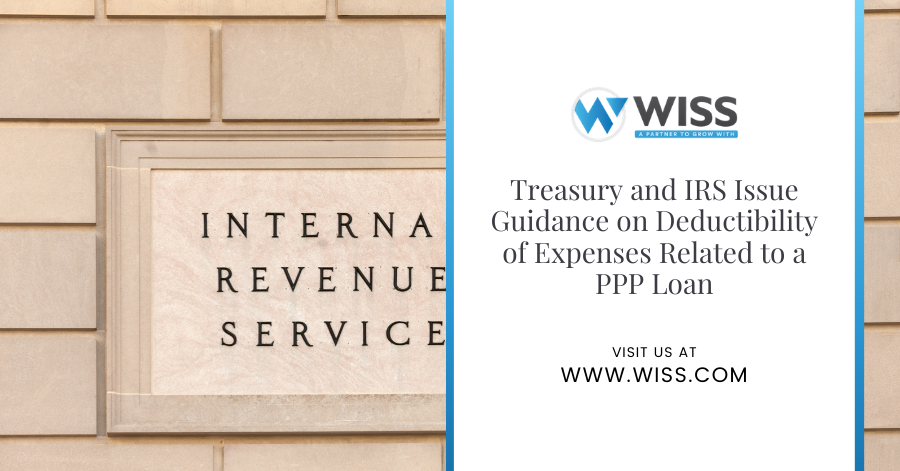By Michael Bodrato, Director of Taxes
The US Treasury and the Internal Revenue Service (“IRS”) released guidance on November 18, 2020, in Rev. Rul. 2020-27 and Rev. Proc. 2020-51, clarifying the tax treatment of expenses where a loan received under the Paycheck Protection Program (“PPP”) has not been forgiven by the end of the year in which the loan was received.
The IRS clarified in a notice issued on May 18, 2020, that since under the CARES Act businesses are not taxed on the proceeds of a forgiven PPP loan, the expenses related to the loan are not tax deductible (see Notice 2020-32).
In Rev. Rul. 2020-27, the IRS ruled that a taxpayer who received a PPP loan and paid or incurred the related expenses listed under the CARES Act (i.e., payroll and other covered expenses), may not deduct those expenses in the year paid or incurred, if at the end of the taxable year, the taxpayer reasonably expects, to receive forgiveness of the PPP loan. In addition, such expenses may not be deducted even if the taxpayer has not submitted an application for forgiveness of the PPP loan by the end of the taxable year.
Rev. Rul. 2020-27, describes two situations. In situation 1, the taxpayer paid all of the eligible expenses that qualified for loan forgiveness and completed the application for PPP loan forgiveness by the end of the taxable year 2020. The IRS ruled that since the taxpayer knew the amount of qualifying eligible expenses at the time of the completion of the PPP loan forgiveness application, the forgiveness of the PPP loan was foreseeable. Consequently, the taxpayer had a reasonable expectation that the PPP loan would be forgiven. Therefore, in this situation the taxpayer may not deduct the eligible expenses in 2020.
In situation 2, the taxpayer paid all of the eligible expenses that qualified for PPP loan forgiveness, however, did not complete an application for covered loan forgiveness by the end of 2020. The taxpayer expects to apply for loan forgiveness in 2021. The ruling concludes that that in this situation since the taxpayer satisfied all other requirements for forgiveness by the end of 2020 and expected to apply for forgiveness in 2021, the taxpayer knew the amount of the eligible expenses that qualified for PPP loan forgiveness and had a reasonable expectation of reimbursement. Therefore, the PPP loan forgiveness was foreseeable and the taxpayer may not deduct the associated expenses in 2020.
Rev. Proc. 2020-51, provides a safe harbor for deducting the eligible expenses related to a PPP loan for taxpayers that find themselves in situations 1 or 2, as described in Rev. Rul. 2020-27, and where in a subsequent taxable year, either 1) the taxpayer’s PPP loan is denied by the lender; or 2) the taxpayer irrevocably decides not to seek forgiveness of the PPP loan. For these taxpayers, Rev. Proc. 2020-51 allows the use of one of two safe harbor procedures:
- Safe harbor for deductions to be claimed in 2020: Under this procedure, the taxpayer may deduct the eligible expenses on the taxpayer’s: 1) timely filed tax return (including extensions); or 2) on an amended return for the 2020 taxable year, as applicable; or
- Safe harbor for deductions to be claimed in a subsequent taxable year: Under this procedure, the taxpayer may deduct the eligible expenses on the taxpayer’s timely filed tax return (including extensions) for the subsequent taxable year.
A taxpayer using either safe harbor may not deduct an amount of non-deducted eligible expenses in excess of the principal amount of the PPP loan not forgiven. In addition, the taxpayer must attach a statement to the return on which the non-deducted eligible expenses are deducted providing certain taxpayer information and information regarding the PPP loan.
Possible Legislative Action: Many still believe there is hope that we may see legislative action from Congress to allow for the deduction of eligible expenses relating to a PPP loan, whether or not the PPP loan is forgiven. We will closely monitor this situation and will promptly send an update if any action is taken in this regard.

 Previous
Previous






